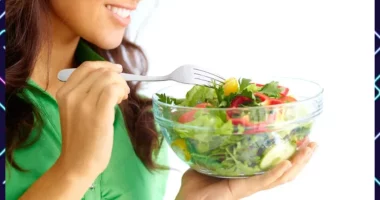The topic “Eating for Energy and Easy Digestion: 7-Day No Sugar Meal Plan to Try Out” focuses on a 7-day meal plan aimed at improving energy levels and digestion by eliminating added sugars. The meal plan includes breakfast, lunch, dinner, and snack options for each day. It also emphasizes the benefits of a no-sugar diet, such as weight loss and improved overall health. The plan is designed to be practical and simple to follow, with an emphasis on whole, nutritious foods. The meal plan is part of a no-sugar challenge that encourages mindfulness about sugar consumption and offers tips for maintaining a sugar-free lifestyle beyond the 7 days.
Day 1
- Breakfast: Smoothie bowl with spinach, banana, berries, almond milk, protein powder, and chia seeds for added fiber.
- Lunch: Lentil soup with whole-wheat bread for protein and fiber. Add chopped vegetables for extra nutrients.
- Dinner: Baked salmon with roasted Brussels sprouts and quinoa. Swap quinoa for brown rice if desired.
- Snacks: Apple slices with almond butter, cucumber slices with hummus. Explore different nut butters and vegetable pairings for variety.
Day 2
- Breakfast: Scrambled eggs with spinach and mushrooms on whole-wheat toast with avocado. Add a drizzle of olive oil for healthy fats.
Lunch: Black bean burger on a whole-wheat bun with lettuce, tomato, and onion. Experiment with different toppings like sauerkraut for gut-friendly probiotics.
Dinner: Chicken stir-fry with brown rice and a variety of colorful vegetables. Choose lean cuts of chicken and customize the veggies based on your preferences.
Snacks: Edamame pods, mixed nuts with dried fruit for a touch of sweetness. Opt for unsalted nuts for lower sodium intake.
Day 3
- Breakfast: Overnight oats with chia seeds, berries, and a sprinkle of cinnamon. Use unsweetened plant-based milk for added calcium.
- Lunch: Quinoa salad with chickpeas, chopped vegetables, and a light vinaigrette dressing. Adjust the vegetables and dressing based on your taste.
- Dinner: Vegetarian chili with kidney beans, black beans, corn, and vegetables. Add chopped greens like kale for extra vitamins and minerals.
- Snacks: Greek yogurt with berries and granola, cucumber slices with cottage cheese for a protein boost.
Day 4
Breakfast: Whole-wheat pancakes with berries and a drizzle of maple syrup (limited portions). Substitute with applesauce for added sweetness without refined sugar.
Lunch: Leftover lentil soup or quinoa salad for a convenient and nutritious option.
Dinner: Shrimp scampi with whole-wheat pasta and steamed broccoli. Opt for brown rice pasta for added fiber.
Snacks: Apple slices with nut butter, carrot sticks with guacamole. Explore different nut butter flavors and experiment with homemade guacamole variations.
Day 5
Breakfast: Chia pudding with almond milk, berries, and chia seeds. Top with hemp seeds for extra protein and healthy fats.
Lunch: Leftover vegetarian chili or black bean burger for a quick and satisfying meal.
Dinner: Baked chicken breast with roasted sweet potatoes and asparagus. Season chicken with herbs and spices for added flavor.
Snacks: Edamame pods, yogurt parfait with granola and fruit. Choose plain yogurt and control the granola portion for mindful sugar intake.
Day 6
- Breakfast: Eggs Benedict with whole-wheat English muffin, Canadian bacon, and hollandaise sauce made with avocado for a healthy twist.
- Lunch: Chicken Caesar salad with grilled chicken, romaine lettuce, Parmesan cheese, and a light Caesar dressing. Opt for a homemade dressing with less oil and sodium.
- Dinner: Baked salmon with roasted Brussels sprouts and quinoa. Substitute quinoa with brown rice or another whole grain of your choice.
- Snacks: Greek yogurt with fruit, mixed nuts. Choose unsweetened yogurt and control the nut portion.
Day 7
- Breakfast: Smoothie bowl with spinach, mango, pineapple, coconut milk, protein powder, and flaxseeds for omega-3s.
- Lunch: Turkey and vegetable wrap on whole-wheat tortilla with hummus and avocado. Experiment with different fillings and spreads based on your preferences.
- Dinner: Lentil soup with whole-wheat bread or a side salad. Enjoy leftovers from earlier in the week or try a new soup variation.
- Snacks: Sliced bell peppers with guacamole, berries with chia seeds for sustained energy.
Health Benefits of a No-Sugar Diet Plan.
Weight loss and management: Sugar is a major source of empty calories, and consuming too much of it can lead to weight gain. Eliminating or reducing added sugar from your diet can help you lose weight or maintain a healthy weight.
Improved blood sugar control: Sugar can cause spikes and crashes in blood sugar levels, which can be especially problematic for people with diabetes or prediabetes. A no-sugar diet can help to stabilize blood sugar levels and improve insulin sensitivity.
Reduced risk of heart disease: High sugar intake is a risk factor for heart disease. A no-sugar diet can help to lower cholesterol levels, reduce inflammation, and improve blood pressure, all of which can contribute to a lower risk of heart disease.
Improved dental health: Sugar is a major culprit in tooth decay. Eliminating or reducing sugar from your diet can help to prevent cavities and other dental problems.
Increased energy levels: Sugar can cause energy crashes, while whole, unprocessed foods provide sustained energy. A no-sugar diet can help you to feel more energized throughout the day.
Improved mood and brain function: Sugar can contribute to mood swings and brain fog. A no-sugar diet can help to improve mood, focus, and cognitive function.
Reduced risk of certain cancers: Some studies have shown that a high sugar intake may be linked to an increased risk of certain cancers. A no-sugar diet may help to reduce this risk.
It is important to note that not all sugar is created equal. Natural sugars found in fruits, vegetables, and dairy products are different from added sugars, which are found in processed foods and drinks. Natural sugars are generally safe to consume in moderation, while added sugars should be limited as much as possible.
In conclusion, intentionally eating for energy and easy digestion isn’t just about dietary trends – it’s about creating a foundation for your well-being from the inside out. By choosing nutrient-rich foods that fuel your body efficiently and support gut health, you unlock a cascade of benefits, from sustained energy and improved mood to better sleep and reduced stress. Remember, it’s a journey, not a destination. Experiment, explore, and enjoy the process of discovering what works best for you as you nourish your body and mind with intention.
ALSO READ: 7 worst drinks that make you feel fatigued









